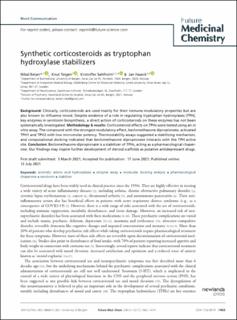Synthetic corticosteroids as tryptophan hydroxylase stabilizers
Journal article, Peer reviewed
Published version

Åpne
Permanent lenke
https://hdl.handle.net/11250/2982838Utgivelsesdato
2021Metadata
Vis full innførselSamlinger
- Department of Biomedicine [708]
- Registrations from Cristin [9489]
Sammendrag
Background: Clinically, corticosteroids are used mainly for their immune-modulatory properties but are also known to influence mood. Despite evidence of a role in regulating tryptophan hydroxylases (TPH), key enzymes in serotonin biosynthesis, a direct action of corticosteroids on these enzymes has not been systematically investigated. Methodology & results: Corticosteroid effects on TPHs were tested using an in vitro assay. The compound with the strongest modulatory effect, beclomethasone dipropionate, activated TPH1 and TPH2 with low micromolar potency. Thermostability assays suggested a stabilizing mechanism, and computational docking indicated that beclomethasone dipropionate interacts with the TPH active site. Conclusion: Beclomethasone dipropionate is a stabilizer of TPHs, acting as a pharmacological chaperone. Our findings may inspire further development of steroid scaffolds as putative antidepressant drugs.
